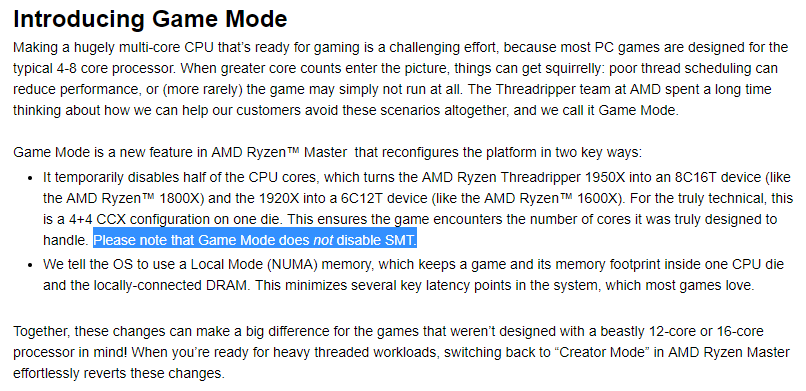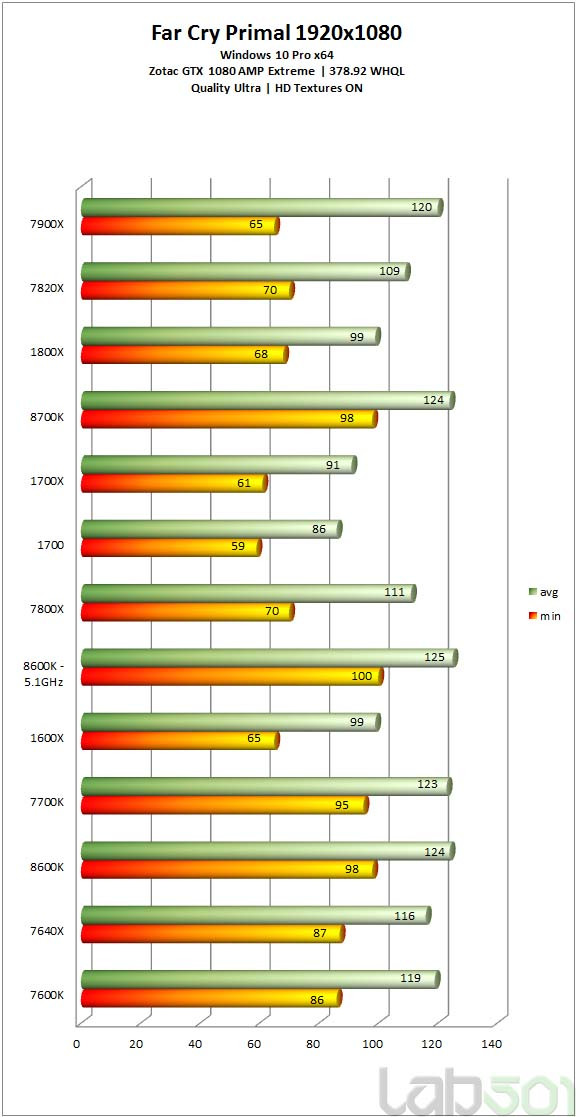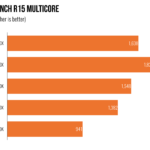TaintedSquirrel
[H]F Junkie
- Joined
- Aug 5, 2013
- Messages
- 12,691
Guess I'll wait for the Code, then. Silicon Lottery should take some time to get stock anyway.
Follow along with the video below to see how to install our site as a web app on your home screen.
Note: This feature may not be available in some browsers.
Wonder what's up with 8600k vs 7700k in some of those charts. Most they are even and 8600k pulls ahead when oc'd but a few are 8600k behind even oc'dlab501 is one of the most objective and professional sites you can find.
They've got a long standing history of high quality reviews and benchmark outputs.
Now watch this Gigabyte commercial.
if your on prime95 but other tasks it wont generate that much heat...just depends the load and how much.LOL 5.4ghz....you'd need ln2 to cool that OC.
I know we all understand these processors, but video bout em nonetheless
I know I do not. I use the [H]. Not sure what else is needed!does anyone here actually waste their time with stupid youtube videos? That is like the biggest waste of time to get info on tech imho.
its.....sooooo slow....sooo much useless talking....i would love to see a video with skip marks for each slide/section and only useful audio....that would be nice...and maybe talk faster?People like things to be delivered for them, instead of dare I say reading.
Pretty sure o/c of ram does not change core to core latency.
https://hardforum.com/threads/wccftech-ram-affects-fps-in-fo4-bullshit.1881718/#post-1041977626it increases performance period whether that is due to reduced latency or increased data throughput its just like ram if you have low latency and low throughput its the same as high latency with a high throughput just like with ram you want the best combination of lowest latency to throughput that equates to the best efficiency.
https://hardforum.com/threads/wccftech-ram-affects-fps-in-fo4-bullshit.1881718/#post-1041977626
see this post for how to calculate latency
exel calculator i made up to 8th word
https://www.dropbox.com/s/7un7fpwg5y30wuj/DDR RAM True Latency Calculator.xlsx?dl=0
cost is primary reason making a low core chip and slapping many together is easier and cheaper than making a massive die. CCX was made to be affordable and scalable.yes I know how it works.
even if overclocking the ram doesn't do anything to core to core latency performance increases due to the increased clock speed (data throughput) its the same with intel's mesh in HEDT CPUs. why AMD chose to tie the IF to the Ram only they probably know but it was a pretty dumb decision imho.
desktop intel cpus use ring bus which someone correct me if i'm wrong but clearly has very low latency and i do believe is tied to the core clock, if not core clock then to the cache clock (uncore) either way its much smarter than tying it to 1066-2000 mhz DDR4...
Pretty sure their main reason though is that they can only afford to design one good chip that can fit into all markets and decided that a HEDT/Server chip was the better way to go profitability wise and they are probably right if they can start making heavy inroads on the server market with EYPC
"Sure,unless there is resource contention and then parallel stuffs run slower" That is somewhat gibberish but I think I understand what you meant. Normally two or more threads when there is hardware available to process will perform quicker overall than a serial one thread at a time configuration.Sure, unless there is resource contention and then parallel stuffs run slower.
Even if there is no contention and each serial stuff runs at same speed than if was running alone, it means nothing in cases when serial stuff has to be executed so fas as possible. Why do you believe AMD invested hundred of millions on improving single thread performance with the new Zen core? Because serial stuff is not relevant anymore?
If serial stuff was irrelevant, AMD had simply ported Jaguar to 14LPP and give us 64 or 128 cores @2.5GHz for desktop, but AMD didn't make this, true?
CoffeeLake provides the best mixture of single thread and multithread performance. the top i7 is able to tie with the top R7 even when all cores are used, but the i7 run circles around the 1800X on the rest of workloads.
Latency is a useless metric?CPUs are instances of LCUs (Latency Compute Unit), whereas GPUs are instances of TCUs (Throughput Compute Units). Latency is a key metric for CPUs and that is why CPUs have a small number of wide cores, high clocks, large caches, deep OOOE logic...
* Wide cores can extract more ILP reducing the execution latency of a sequence of code
* High clocks reduce latency by reducing the time spend on a cycle
* large caches reduce accesses to main memory, which reduces latency because main memory is slower
* deep OOOE logic reduce latency by processing a larger instruction window istead stalling the pipeline
* And so on
Latency is the reason why virtually any AMD fanboy is on forums recommending the use of 3200MHz or higher RAM for Zen. Latency is the reason why it is now common for most reviews to test RyZen and ThreadRipper always with memory overclocked. Overclocking RAM reduces the latency penalty of the Zen microarchitecture and improves performance of AMD chips. It reduces latency twice. First because faster RAM reduces the access latency to RAM, second because RAM clocks are tied to Infinity Fabric on AMD chips, and the latency of the interconnect is reduced as well, which alleviates the CCX-CCX penalty.
Latency is the reason why operative systems schedule dependent threads in the same CCX rather than on separate CCX. Having dependent threads executing in the same CCX eliminates the latency penalty associated to sending/receiving data between different CCX and improves performance of AMD chips.
Latency is the reason why ThreadRipper has a game mode and a creation mode, with the first mode disabling one of the dies to eliminate the huge die-die latency for improving performance of AMD chips on games.
EDIT: If you check the link given by Shintai in #2315, you can see how AMD mentions latency in its own docs about the gaming mode on ThreadRipper.
Read it again and see what I actually state. Its just going to be bad excuses no matter who gets the blame. Intel, AMD, developers because games in by nature not designed for it.
And ns in latency is huge between clusters. Try calculate how many cycles that is. We already know its around 190 on consoles and being a problem there. The ping for the 1800X for example is something like 518 cycles.
There is a reason as well why TR got "gaming" mode.

Some folks just get bogged down on one thing and virtually can't see beyond that. Latency can be traded for prediction, predicting what is needed and fetching can incur latency but yet overall gives a higher average compute output. Ryzen predictive capability is good which can hide the extra latency. You can trade latency to allow more processing of threads at the same time, more cores where the threads may take longer to compete individually but all the threads being processed will complete faster overall and will be more productive. In other words latency has to be balanced with what work loads are being done. For example gaming, yes you can show that Intel can process gaming frames faster when the gpu is not limited -> reality is the CPU is fast enough to process everything that the GPU can process and is not the limitation for normal game use, even the fastest GPU's. Also game design can also take advantage of the additional assets like more cores at times making the difference totally irrelevant for the gaming experience.Shintai, you said Zen/consoles. And you know they (the main/popular multi core designs) are all AMD.
You are both twisting this around to attack AMD as usual every damn time, which was the whole point why I bought this up when Shintai took a stab at Zen for 'high latency'.
The point was that your fabled 7900x has practically the same latency as a Ryzen on 3200. 3200 is on QVL, it is not over clocking. Many people run 3000-3200 if they do their research.
Now all of a sudden that latency which is fine on a 7900, is bad because AMD and juan/shintai said so?
Threadripper isn't a gaming CPU, so of course it has a gaming mode due to the unique design. A mode which cannot be used on e.g. 7900x or other high core HEDT intel parts, which stay around 100ns. TR has lower latency within a CCX than 7900 and above if only using four cores or lower, which happens to be a majority of scenarios. So if latency is king as you say, then TR is a better CPU for gaming + HEDT than 7900 etc if all else is equal. But we know that's not the case.
Funny how either of you you never, ever concede the point that latency is therefore also higher on high core HEDT intel designs, or anything that might reduce your rewards for pro-intel crap here.
Thing I find funny is they (7900/TR etc) are more than fine for gaming, to the point where clock for clock, outside of cache and other issues I bet there would be almost zero FPS difference between e.g. 7900 and 8700.
So in summary, both your points are moot in most cases is where I'm going, latency around/below 7900x levels is more than sufficient, that also includes Zen on 3000-3200 memory as a vast amount are operated.
Pretty sure o/c of ram does not change core to core latency.
The point was that your fabled 7900x has practically the same latency as a Ryzen on 3200. 3200 is on QVL, it is not over clocking. Many people run 3000-3200 if they do their research.
Now all of a sudden that latency which is fine on a 7900, is bad because AMD and juan/shintai said so?
Threadripper isn't a gaming CPU, so of course it has a gaming mode due to the unique design. A mode which cannot be used on e.g. 7900x or other high core HEDT intel parts, which stay around 100ns. TR has lower latency within a CCX than 7900 and above if only using four cores or lower, which happens to be a majority of scenarios. So if latency is king as you say, then TR is a better CPU for gaming + HEDT than 7900 etc if all else is equal. But we know that's not the case.
Funny how either of you you never, ever concede the point that latency is therefore also higher on high core HEDT intel designs, or anything that might reduce your rewards for pro-intel crap here.
Thing I find funny is they (7900/TR etc) are more than fine for gaming, to the point where clock for clock, outside of cache and other issues I bet there would be almost zero FPS difference between e.g. 7900 and 8700.
So in summary, both your points are moot in most cases is where I'm going, latency around/below 7900x levels is more than sufficient, that also includes Zen on 3000-3200 memory as a vast amount are operated.
"Sure,unless there is resource contention and then parallel stuffs run slower" That is somewhat gibberish but I think I understand what you meant. Normally two or more threads when there is hardware available to process will perform quicker overall than a serial one thread at a time configuration.
Since you have multiple threads in modern OS's and software, typically you have thousands of threads running or available depending upon what is going on, having more hardware to process those as needed can win out over a higher IPC processor but less threads available - a.k.a 7700K and 1800X rendering in Cinebench. Just depends what is being processed.
CoffeLake is looking rather good and having more cores made the real difference, not the IPC gain if there is any. Intel is at least advancing mainstream here albeit I think AMD has done more for the mainstream with RyZen so far. If the 8700K is around $350, 8600K low $200 that will definitely compete well with RyZen in virtually everything for the mainstream I do believe. It should make for one hell of a snappy system as well and will probably force AMD to reduce pricing and make sure RyZen + comes out sooner rather than later.
IPC of RyZen is really good, clockspeed is what is holding it back in competing with Intel on some workloads. The good thing is we have better choices now to choose from.
Pretty sure o/c of ram does not change core to core latency.


testing says otherwise as well..of course this isn't core to core its CCX to CCX. Ryzen is two quad cores on a single die.
Those times are for core to core, with each core in a different CCX.
Yes, Intel is ahead of AMD. Not sure 10-20% performance should include a 50%+ price difference.On AMD Zen, overclocking RAM changes the core to core latency for cores in different CCX.
7900X doesn't have same latency than RyZen/ThreadRipper. The 7900X has significant lower latency and that is why it has superior gaming performance than Zen.
The CoffeLake family is even more optimized for latency and that is why it will be preferred choice for gamers. As you know AMD uses the 7700k for its gaming demos. In a future AMD will use CoffeLake for its demos.
Normally != always.
I have mentioned three or four times that the main performance gains in CoffeLake are coming from extra cores. It is not needed you say the same to me.
Zen IPC is a good 10--20% behind Kabylake. In fact AMD engineers are working in ways to improve the IPC for Zen2. The problem for Zen is that it lacks on both IPC and clocks. That is why a 6X CofeeLake can compete with 8C RyZen even in total throughput.
Intel and AMD will be very competitive at these prices. There is no way Ryzen will drop until Pinnacle Ridge.
You still need to look at the platform cost.
B350 motherboards can be found for $70 or less. The cheapest z270 I saw was $105. I have a feeling z370 will start higher.
So, you are looking at $420 for a 1700x/mb combo. An 8700k/mb will be $470 MINIMIUM.
The same goes for the 1600(x) vs the 8600k combo.
The 8700 will be a tougher sell if Intel doesnt release a cheap H series mb.
Zen IPC is a good 10--20% behind Kabylake. In fact AMD engineers are working in ways to improve the IPC for Zen2. The problem for Zen is that it lacks on both IPC and clocks. That is why a 6X CofeeLake can compete with 8C RyZen even in total throughput.
There is no way Ryzen will drop until Pinnacle Ridge.
Shintel, what a joke. Show be where Ryzen is 30% behind KBL other than a poorly optimized game.
Now they are poorly?
So you admit its the case, you just didn't want to accept them. Thanks
Yes, Intel is ahead of AMD. Not sure 10-20% performance should include a 50%+ price difference.


looks to me though that u admit u cant find one without cherry picking. i've read many posts u posted and most are cherry pick, which is kinda sad. but that is okay because people have their preference and if you love to defend your beloved company thats you. i like intel cpu cause they are faster for majority of legacy software and software that wont get optimized for next 5+ yrs but we all understood its because of AMD we are even getting 8core maintstream CPU from intel, otherwise another 10yrs milking of 6 cores.
Shintel, what a joke. Show be where Ryzen is 30% behind KBL other than a poorly optimized game.


I'm a bit confused on the Ram comment.
Ram should cost the same for both platforms if the buyer does not have it already.